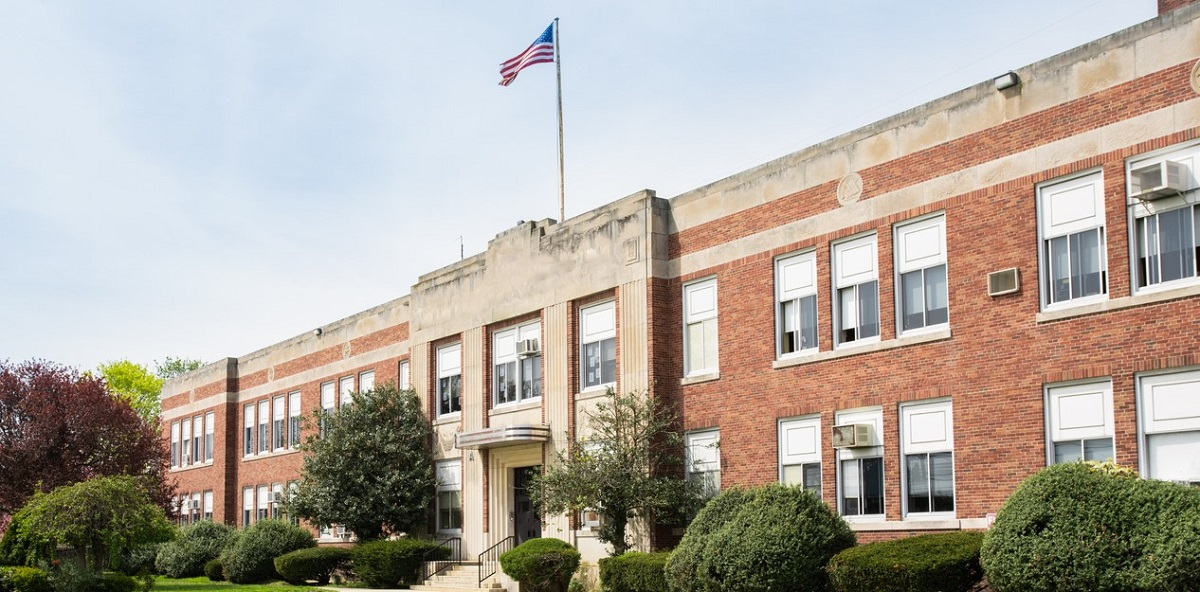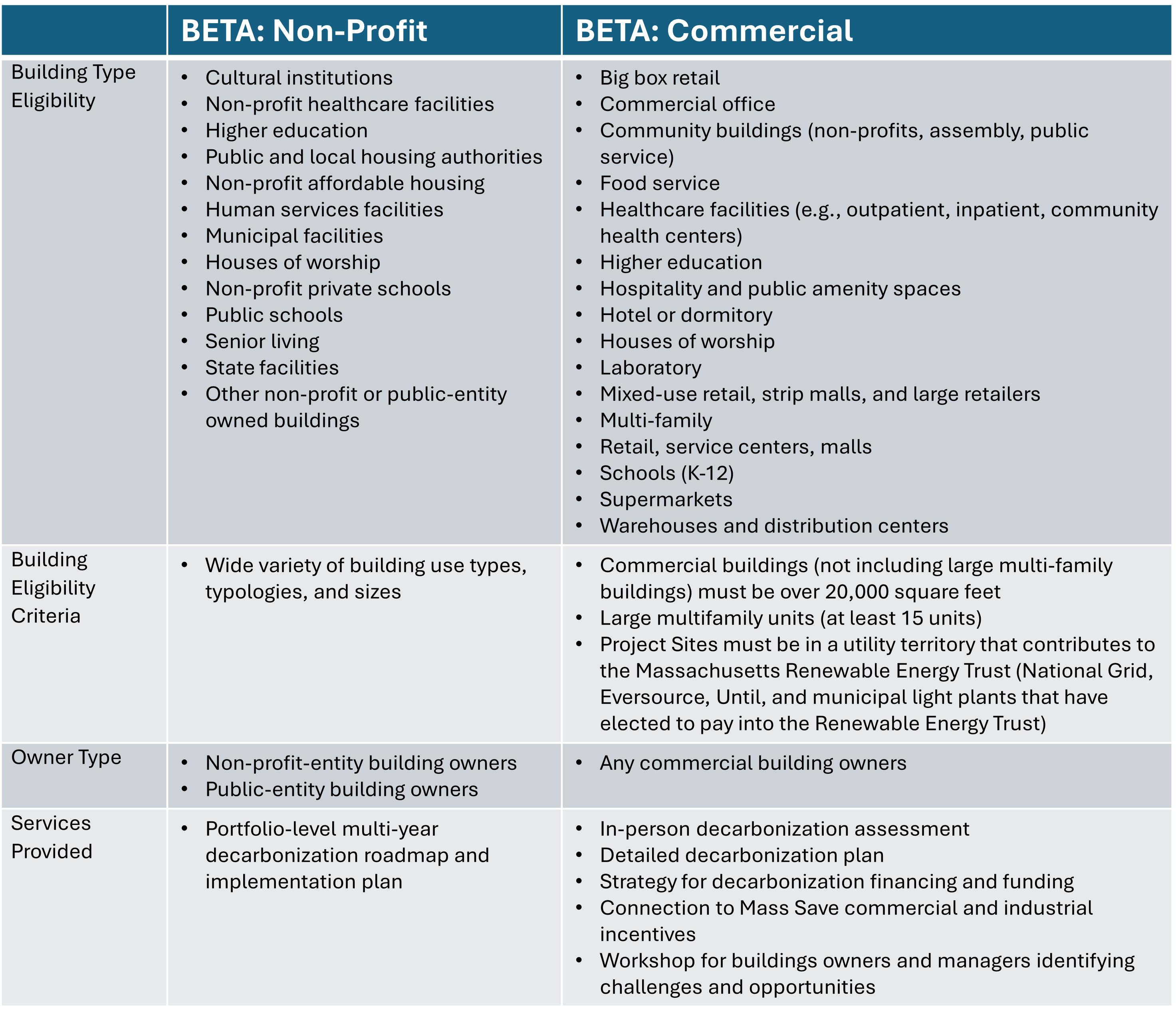
The Challenge: Decarbonize Small-Medium Buildings Owned by Non-Profit or Public Entities
Non-profits and public entities face uniquely complex procurement, financing, and management processes for their building portfolios, which result in additional barriers to implementing already-challenging building decarbonization practices for existing buildings. Given that non-profits and public entities own a sizable portion of the Commonwealth’s building stock, and that many of these buildings have the potential to “lead by example,” this sector offers a great opportunity to establish practices for the decarbonization of building portfolios. To facilitate these transitions, these building owners often need roadmaps to:
- Initiate planning discussions
- Support decision-makers with capital and budget planning
- Enable procurement pathways
- Identify options for reducing cost, risk, and process challenges in decarbonizing
About the Building Electrification and Transformation Accelerator (BETA): Non-Profit Buildings Pilot
The Building Electrification and Transformation Accelerator (BETA): Non-Profits Pilot is a MassCEC initiative in partnership with PowerOptions with the objective of accelerating the electrification and decarbonization of the building segment owed by non-profits and public entities. This pilot provides non-profit and public-entity building owners with a high-level overview of decarbonization opportunities aligned with building capital needs across their portfolios, with the target of zero-emissions building portfolios by 2050. The pilot provides actionable roadmaps and is intended to enable efficient, effective procurement strategies that address the unique needs of non-profits and public entities.
The BETA: Non-Profits Pilot aligns with the MassCEC High-Performance Buildings strategy, which has as top priorities to 1) the surfacing and demonstration of building decarbonization approaches and 2) the support of “zero-over-time” planning. This pilot also supports the Commonwealth’s building decarbonization goals expressed in the Clean Energy & Climate Plan for 2030, which calls for a broad and aggressive transition of statewide buildings by 2030, including improving building envelopes and electrifying 300 to 400 million square feet of commercial-scale buildings. The pilot will help establish clear pathways for this sector to align with these building decarbonization goals.
Custom electrification and decarbonization plan, including financing analysis
Rolling, deadline TBD
Project Team
MassCEC is pleased to have PowerOptions under contract as the Lead Technical Consultant. PowerOptions has a proven track record with non-profits and public entities in supporting energy procurement and facilitating energy transition actions. This makes PowerOptions a uniquely qualified partner for MassCEC’s building decarbonization programs.
Participant Benefits
Participants of the BETA: Non-Profit Pilot receive a decarbonization roadmap at a nominal fee per building enrolled. These roadmaps include electrification and decarbonization plans, including financing options and a proposed implementation timeline by building.
The pilot approach consists of four components of services offered to participating entities:
- Capturing and analyzing the carbon footprint of building portfolios using building-level energy usage data
- Evaluating holistic building decarbonization measures (energy efficiency, electrification, on-site renewables, RECs as offsets) based on building-specific data
- Developing high-level multi-year roadmap and implementation plan based on economic and feasibility assessments
- Supporting implementation through procurement and measuring performance
PowerOptions established and is utilizing several key resources to provide these services, including:
- Offering the services of a carbon reduction advisor and data analyst
- Implementing an energy data platform for automation and visualization, a virtual energy efficiency audit tool, and a proprietary building decarbonization model
- Integrating supplier and utility energy data, building topology, HVAC, and other source data available through data licenses, as well as data from the building owners
Who's Eligible to Participate?
Non-profit and public entity building portfolio owners in Massachusetts are eligible to participate in the BETA: Non-Profit Pilot. The buildings in participants’ portfolios may represent a wide variety of building use types, typologies, and sizes. Example building types include, but are not limited to, cultural institutions, non-profit healthcare facilities, higher education, public and local housing authorities, non-profit affordable housing, human services facilities, municipal facilities, non-profit private schools, public schools, senior living, religious institutions, and state facilities.
Which Program is Right for Us?
MassCEC's Building Electrification and Transformation Accelerator (BETA) has two pilot programs underway:
- BETA: Non-Profit
- BETA: Commercial
Both programs help decarbonize a wide range of buildings across the Commonwealth, but differ in eligibility criteria and services provided. The following table can help you decide which program better fits your needs.

Enrollment Process
Contact energyteam@poweroptions.org to express your interest in participating in BETA: Non-Profit or to discuss any questions about eligibility.
General questions for MassCEC may be addressed to buildings@masscec.com.
Resources
Example Roadmap
Learn About High Performance Buildings
Additional Funding Opportunities
BETA: Commercial Buildings Pilot
Each participating building will receive an electrification and decarbonization plan, including direction to financing options and a recommended implementation timeline.
Rolling, until 15 selected
EmPower Massachusetts
$300,000 (Priority Track Implementation)
$150,000 (Non-Priority Track Implementation)
$50,000 (Innovation & Capacity Building)
Innovation and Capacity Building: Rolling through April 3, 2024
Implementation: October 18, 2023 and April 3, 2024
Clean Energy Internship Program for Employers
$4,320/intern for Fall or Spring session; $8,640/intern for Summer session